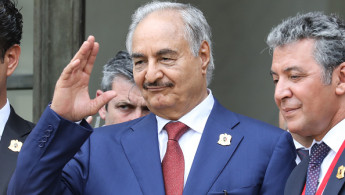Libya: Khalifa Haftar backs creation of new government in challenge to Tripoli's GNA
Libya's eastern forces under commander Khalifa Haftar support a proposal to set up a new interim government, they said late on Friday, setting up a challenge to the existing administration in Tripoli.
Haftar's Libyan National Army (LNA) said it supported the recommendations of the 6+6 committee, a group drawn from two legislative chambers that have proposed new electoral laws. It urged the two chambers to agree on a new government.
The committee's recommendations have been adopted by parts of Libya's divided political establishment and rejected by others.
It is not clear whether they can eventually form the basis for an election and Prime Minister Abdulhamid Dbeibah in Tripoli is sure to oppose the creation of any new government before an election.
Libya has had little peace since a NATO-backed uprising in 2011 and it split in 2014 between warring eastern and western factions, though open conflict has mostly paused since a ceasefire in 2020.
Dbeibah's Government of National Unity in Tripoli was installed through a UN-backed process in 2021 aimed at holding elections later that year - which were cancelled because of disputes over the rules.
The eastern-based parliament, which has been allied to Haftar, rejected Dbeibah's mandate but the new prime minister it designated was unable to replace the Tripoli government, leading to a long political standoff.
Diplomacy has focused on bringing the parliament and another legislative body, the High State Council, to agree clear rules for an election aimed at resolving Libya's political stalemate.
However, moves by the parliament to amend the constitution, and by the 6+6 committee to set out electoral laws, remain contested.
Critics of Libya's political elite believe they have little intention of holding elections that could remove them from power and are more focused on control over government in Tripoli and its access to state resources.
Opponents of Dbeibah have tried since early last year to exploit divisions among the armed factions in western Libya to force him from office, but his military allies have instead managed to consolidate their control in the capital.
(Reuters)





 Follow the Middle East's top stories in English at The New Arab on Google News
Follow the Middle East's top stories in English at The New Arab on Google News


